A high-risk pregnancy means there is a greater chance the baby or mother will experience such problems as abnormal fetal development, early (premature) labor and placenta previa.
Numerous factors characterize a high-risk pregnancy, such as the mother has a pre-existing health condition (like diabetes, chronic hypertension, epilepsy, kidney disease, sickle cell anemia, lupus or cancer); is older than 35; is pregnant with multiples (like twins or more); smokes, drinks or uses drugs; has a pregnancy history of several miscarriages, early labor or preeclampsia; has a family history of genetic conditions or the baby has already been diagnosed with a genetic condition…
Women with high-risk pregnancies usually have more ultrasounds, and exams that are more targeted or detailed, compared to those not at risk. Sonographers who perform these exams must be specialized in high-risk obstetrics so that they understand the associated health problems and concerns and are able to work with patients (who may be quite distressed or worried) in a compassionate manner.
Sonographers and High Risk Pregnancies
Sonographers who specialize in performing ultrasounds for high risk pregnancies may be called: Perinatal Sonographers, Perinatology Sonographers, and High Risk OB (Obstetric) Sonographers, among other titles.
These specialized sonographers work under the direction and present their findings to the patient’s physician, obstetrician, perinatologist, OB/GYN or other Maternal Fetal Medicine specialist (depending on the workplace). In addition to performing accurate, high quality ultrasound exams and having a firm knowledge in physiology and anatomy relevant to obstetrics, the perinatal sonographer must be a continuous learner.
A recent job posting from St. Louis Park, Minnesota, perhaps describes the position best: “…it is the responsibility of this [sonography] department to very carefully screen for prenatal detection and diagnosis of anomalies so the perinatologist can offer final recommendations that potentially improve the outcomes of the pregnancy.”
Qualifications
Qualifications naturally vary by position/employer, but some common requirements to becoming a high-risk OB sonographer might include:
- Completion of an accredited sonography degree
- Sonography Certification (i.e. RDMS with an OB/GYN specialty)
- Licensure (if required by your state)
- CPR Certification
- Several years experience as a sonographer and also experience with high risk pregnancy ultrasounds
- Knowledge of fetal development and pregnancy conditions.
- Commitment to continuing education
Stand Out from the Crowd
If you are striving to specialize as a perinatal sonographer there are some extra courses and certifications you can pursue. Some may even be required or highly preferred by prospective employers. Either way, completing further training demonstrates your commitment to lifelong learning.
Examples of ways to increase your expertise and employability include:
- Certifications in First Trimester Screening and Nuchal Translucency Ultrasound
- Experience/training/certification in Fetal Echocardiography (such as RDCS certification with a specialty in Fetal Echocardiography certification through the ARDMS)
- Attending conferences related to OB/GYN and high-risk pregnancy ultrasounds.
- Fulfilling required CME credits by selecting courses related to obstetrics and high-risk pregnancies.
High risk OB sonographers play a valuable role. Philip Samuels, MD, in his paper “Sonography of Medical Conditions During Pregnancy” wrote:
“In a complicated pregnancy in which the patient receives frequent sonograms, the sonographer and the patient often establish a rapport and the patient develops a trust in the sonographer. Often, in conversation, the sonographer can glean information that is crucial in helping the physician provide appropriate care for the patient. It is important, therefore, that the sonographer understand the pathophysiology of the common medical diseases that may have an impact on pregnancy outcome. In this way, the sonographer can individualize the exam to provide the physician with the most useful clinical information, and can simultaneously listen for verbal clues that may impact health care.”
Visit our career center to learn more about becoming an Obstetric Sonographer.
Resources:
- https://www.ardms.org/get-certified/rdms/obstetrics-gynecology/
- https://www.hopkinsmedicine.org/gynecology_obstetrics/specialty_areas/maternal_fetal_medicine/
- https://wexnermedical.osu.edu/
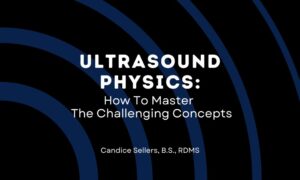
Candice Sellers, B.S., RDMS – Contributor Students attending ultrasound school consistently report that ultrasound physics is one of the most difficult courses in their program. It’s a required course and one that is important to master. Below you will find study tips and tools available to students to help them focus and hone in on…
How I Mastered Ultrasound Physics
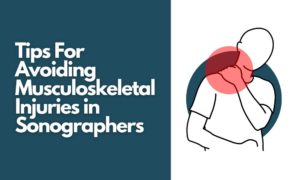
By Adrienne Hardy, RDMS (Ab, Ob/Gyn) – Contributor According to the SDMS, 90% of sonographers will sustain a work related musculoskeletal disorder; 20% will have a career ended because of the injury. With numbers this high it seems like it’s an inescapable truth that you must scan in pain or get injured at some point…
Most Common Injuries in Sonographers

By Adrienne Hardy, RDMS (Ab, Ob/Gyn) – Contributor As I sat in my entrance interview for sonography school the professors spattered me with questions: “Do you have enough savings? What is your home like? How do you manage your time? Do you have someone who cares about your success and will support you in hard…
Surviving and Thriving in Sonography School
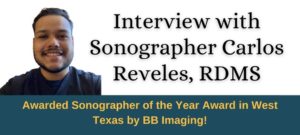
We recently had the pleasure of speaking with Carlos Reveles, a high risk Ob/Gyn sonographer. In this interview, Carlos shares with us what led to him being recently recognized as a standout sonographer by his employer, and what it’s like being a male in a traditionally female field. Welcome Carlos! Hello my Name is Carlos…
Explore Carlos’s Sonography Journey

Adrienne Hardy, RDMS (Ab, Ob/Gyn) – Contributor I clicked submit on the SPI physics exam and ran out the the room. The test proctor handed me a piece of paper with a huge scared looking picture of myself taken before the exam, my ARDMS number and the results of my SPI examination. My hand shook as…
Passing the Sonography Principles and Instrumentation Exam

Candice Sellers, B.S., RDMS – Contributor The Ultrasound School Experience Ultrasound school is a very exciting and rewarding experience. The excitement of finally reaching your goal of getting accepted into an accredited ultrasound program is certainly a tremendous milestone! However, there will be moments of frustration and stress that will occur during your journey in…
How I Managed Stress While in My Sonography Program
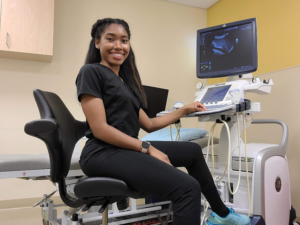
DruAusten Fields, RDMS (AB, OB/GYN), RVT – Contributor The Skilled Sonographer, DruAusten Fields, RDMS (AB, OB/GYN), RVT looks back on the development of her SPI test prep mini-course, and her work to help others pass their SPI exam. When I look back on where I started versus where I am, I can confidently say I have…
Tap into Dru’s Diagnostic Imaging Expertise
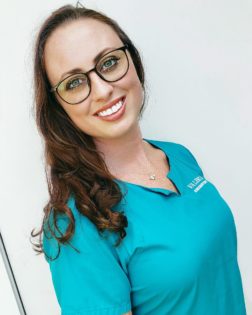
Adrienne Hardy, RDMS (Ab, Ob/Gyn) – Contributor What to expect as you transition from DMS student to the medical imaging workplace. Congratulations! You ran the marathon of Sonography school and now have gotten a job! What a relief, right? All the pent up anxiety and pressure of ultrasound school feels let off like a pressure valve…
Surviving the Transition: From Student to Sonographer Pro!
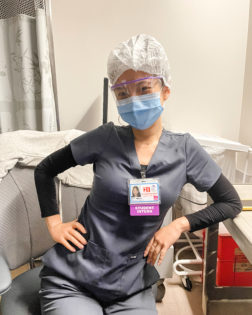
Lynn Nguyen – Sonography Student & Contributor Join Lynn on her journey as she pursues a 2nd career as a sonographer. Why Sonography? How Did I Get Here? I have never given sonography a thought much less loving the thought that I am going to be a sonographer one day. In high school I knew…
Why I Chose Diagnostic Medical Sonography

DruAusten Fields, RDMS (AB, OB/GYN), RVT – Contributor The Skilled Sonographer, DruAusten Fields, RDMS (AB, OB/GYN), RVT shares her sonography story! From Indecision to Decision Deciding on a lifelong career can be stressful, especially at a young age. During high school was when I began toying with the idea of pursuing a career in the…
Systems for Success in Sonography

Sam Callis, contributor at USI, is an author and sonographer with experience in multi-specialty clinical practice, higher education, and the medical device industry. She is the author of Diagnostic Medical Sonography – The Definitive Guide to Planning Your Career. We were first introduced to Samantha back in 2019 with this terrific interview in which she…
From Art to Science: A Sonographer’s Unique Career Path
The demand for healthcare professionals, including those specializing in medical imaging, continues to rise. As the aging baby boomer population grows, there is an increasing need for diagnostic imaging procedures, alongside a demand for new providers to fill positions vacated by retiring workers. This ongoing expansion in medical imaging careers presents excellent opportunities for individuals…
Updated for 2025












